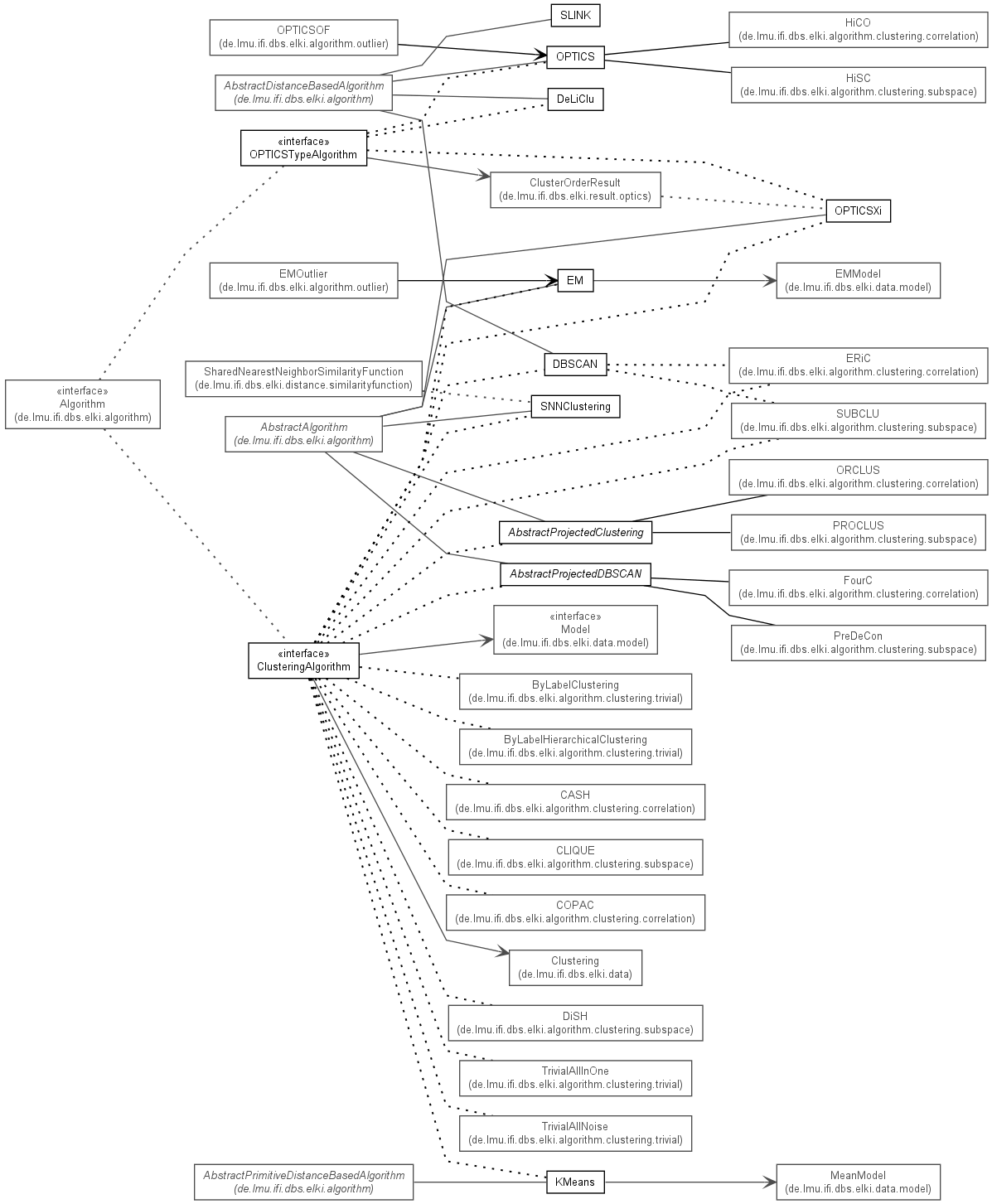
Algorithm-Interface.See: Description

| Interface | Description |
|---|---|
| ClusteringAlgorithm<C extends Clustering<? extends Model>> |
Interface for Algorithms that are capable to provide a
Clustering as Result. in general, clustering algorithms are supposed to
implement the Algorithm-Interface. |
| OPTICSTypeAlgorithm<D extends Distance<D>> |
Interface for OPTICS type algorithms, that can be analysed by OPTICS Xi etc.
|
| Class | Description |
|---|---|
| AbstractProjectedClustering<R extends Clustering<Model>,V extends NumberVector<V,?>> | |
| AbstractProjectedClustering.Parameterizer |
Parameterization class.
|
| AbstractProjectedDBSCAN<R extends Clustering<Model>,V extends NumberVector<V,?>> |
Provides an abstract algorithm requiring a VarianceAnalysisPreprocessor.
|
| AbstractProjectedDBSCAN.Parameterizer<V extends NumberVector<V,?>,D extends Distance<D>> |
Parameterization class.
|
| DBSCAN<O,D extends Distance<D>> |
DBSCAN provides the DBSCAN algorithm, an algorithm to find density-connected
sets in a database.
|
| DBSCAN.Parameterizer<O,D extends Distance<D>> |
Parameterization class.
|
| DeLiClu<NV extends NumberVector<NV,?>,D extends Distance<D>> |
DeLiClu provides the DeLiClu algorithm, a hierarchical algorithm to find
density-connected sets in a database.
|
| DeLiClu.Parameterizer<NV extends NumberVector<NV,?>,D extends Distance<D>> |
Parameterization class.
|
| EM<V extends NumberVector<V,?>> |
Provides the EM algorithm (clustering by expectation maximization).
|
| EM.Parameterizer<V extends NumberVector<V,?>> |
Parameterization class.
|
| KMeans<V extends NumberVector<V,?>,D extends Distance<D>> |
Provides the k-means algorithm.
|
| KMeans.Parameterizer<V extends NumberVector<V,?>,D extends Distance<D>> |
Parameterization class.
|
| OPTICS<O,D extends Distance<D>> |
OPTICS provides the OPTICS algorithm.
|
| OPTICS.Parameterizer<O,D extends Distance<D>> |
Parameterization class.
|
| OPTICSXi<N extends NumberDistance<N,?>> |
Class to handle OPTICS Xi extraction.
|
| OPTICSXi.Parameterizer<D extends NumberDistance<D,?>> |
Parameterization class.
|
| OPTICSXi.SteepArea |
Data structure to represent a steep-down-area for the xi method.
|
| OPTICSXi.SteepAreaResult |
Result containing the chi-steep areas.
|
| OPTICSXi.SteepDownArea |
Data structure to represent a steep-down-area for the xi method.
|
| OPTICSXi.SteepScanPosition<N extends NumberDistance<N,?>> |
Position when scanning for steep areas
|
| OPTICSXi.SteepUpArea |
Data structure to represent a steep-down-area for the xi method.
|
| SLINK<O,D extends Distance<D>> |
Efficient implementation of the Single-Link Algorithm SLINK of R.
|
| SLINK.CompareByLambda<D extends Distance<D>> |
Order a DBID collection by the lambda value.
|
| SLINK.Parameterizer<O,D extends Distance<D>> |
Parameterization class.
|
| SNNClustering<O> |
Shared nearest neighbor clustering.
|
| SNNClustering.Parameterizer<O> |
Parameterization class.
|
Clustering algorithms
Clustering algorithms are supposed to implement theAlgorithm-Interface.
The more specialized interface ClusteringAlgorithm
requires an implementing algorithm to provide a special result class suitable as a partitioning of the database.
More relaxed clustering algorithms are allowed to provide a result that is a fuzzy clustering, does not
partition the database complete or is in any other sense a relaxed clustering result.de.lmu.ifi.dbs.elki.algorithm